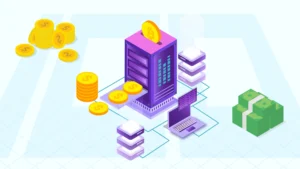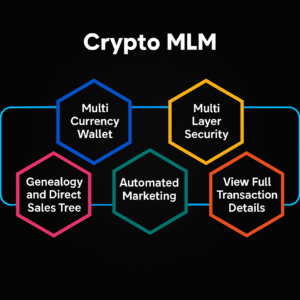
As businesses look for better ways to operate, many are turning to blockchain technology. Hyperledger is an important project that offers various tools and frameworks to help companies build their blockchain solutions. In this blog, we’ll explore the top five Hyperledger solutions, their features, applications, and how blockchain consulting services can help implement these technologies effectively.
What is Hyperledger?
Hyperledger is an open-source collaborative project hosted by the Linux foundation, aimed at advancing cross-industry blockchain technologies. Unlike Public blockchains like Bitcoin and Ethereum, Hyperledger focuses on permissioned blockchain solutions, allowing organizations to create private networks where participants can securely share data and collaborate. This framework is particularly useful for enterprises seeking to improve processes in sectors such as finance, supply chain, healthcare, and more. Hyperledger provides a modular architecture, enabling developers to build tailored blockchain applications that suit their specific business needs while ensuring security, scalability, and privacy. Through various frameworks and tools, Hyperledger fosters innovation and helps organizations leverage blockchain technology effectively.
How Does Blockchain Hyperledger Work?
Blockchain hyperledger works by providing a flexible framework for organizations to create private blockchain networks that meet their specific needs. It includes several important features, such as consensus mechanisms to validate transactions, smart contracts that automate processes, and identity management to control who can access the network. Organizations can choose different consensus methods based on their requirements, ensuring both security and efficiency. Smart contracts are like self-executing agreements that follow predefined rules, reducing the need for middlemen. Hyperledger also focuses on managing identities, allowing organizations to decide who has access and what they can do. Additionally, with blockchain consulting services, businesses can get expert advice on how to implement Hyperledger effectively, helping them understand the technology better and optimize their solutions. This combination makes Hyperledger a great choice for secure and efficient collaboration among trusted partners in various industries.
Top 5 Hyperledger Solutions in Blockchain
-
Hyperledger Fabric
This is one of the most popular frameworks within Hyperledger. It is designed for enterprise applications, offering a modular architecture that allows organizations to customize their blockchain solutions. Fabric supports smart contracts, known as chain code, and enables private transactions, making it ideal for businesses that require confidentiality and scalability.
-
Hyperledger Sawtooth
This framework is known for its flexibility and supports multiple consensus algorithms. Sawtooth is particularly well-suited for applications in supply chain management and the Internet of Things (IoT). Its design allows developers to create customizable blockchain solutions that can easily adapt to changing business requirements.
-
Hyperledger Iroha
Focused on simplicity and ease of use, Iroha is aimed at mobile and web applications. It features a straightforward API, making it accessible to developers of all skill levels. Iroha is ideal for managing digital assets and identities, and streamlining the development process for businesses looking to integrate blockchain technology.
-
Hyperledger Indy
This framework is specifically designed for decentralized identity solutions. Indy allows users to create, manage, and share digital identities securely while maintaining privacy. It is particularly useful for applications requiring trusted identity verification, such as in finance, healthcare, and online services.
-
Hyperledger Burrow
Burrow is a permissioned smart contract platform that integrates with the Ethereum virtual machine (EVM). It allows developers to build applications using familiar Ethereum tools while benefiting from a permissioned environment. This makes it a great option for organizations looking to leverage existing Ethereum knowledge while ensuring security and compliance.
Use Cases of Hyperledger Fabric
Hyperledger Fabric is used in many industries because it is flexible and can be customized. In supply chain management, it helps companies track products from the start to the final destination, making everything more transparent and reducing fraud. In healthcare, it keeps patient records safe, allowing only authorized doctors to access them while keeping the information private.
Banks use Hyperledger Fabric for fast and secure transactions, like international payments, where speed and safety are very important. It also helps with digital identity management, which is needed for KYC (Know Your Customer) in banking. Elliptic curve cryptography (ECC) is used to keep transactions and identity verification safe from fraud.
Voting systems can also use Hyperledger Fabric to make elections more secure and transparent, ensuring that votes are counted correctly. Businesses can use custom blockchain development services to create solutions that fit their needs. Overall, Hyperledger Fabric improves security and efficiency in many areas.
Hyperledger Technology Layers
-
Application Layer
This is the top layer where users interact with the blockchain. It includes user-friendly interfaces, dashboards, and APIs that developers use to create custom applications. This layer is important because it helps users easily access and use the blockchain’s features, regardless of their technical skills.
-
Smart Contract Layer
This layer contains smart contracts, which are self-executing agreements that run automatically when certain conditions are met. Smart contracts help automate tasks like payments and asset transfers, reducing the need for middlemen and speeding up processes. Organizations can customize these contracts to fit their specific needs, making workflows more efficient.
-
Consensus Layer
This layer is responsible for making sure everyone in the network agrees on the transactions. It uses different methods, called consensus algorithms, to validate and confirm transactions. By ensuring that most participants agree, this layer helps maintain the integrity and security of the blockchain.
-
Networking Layer
The networking layer manages communication between the different nodes (or computers) in the blockchain. It allows these nodes to share information securely and keep everything in sync. This layer is crucial for ensuring that data is transmitted safely and efficiently among users.
-
Data Layer
This layer stores all the data on the blockchain, including transaction histories and smart contracts. It keeps the information organized and secure, allowing for quick access when needed. The design of this layer is important for maintaining high performance, especially as more transactions and users join the network.
Why Nadcab Labs for Hyperledger?
Choosing Nadcab Labs for your Hyperledger solutions brings many benefits. Their team of experienced blockchain developers understands Hyperledger well and will help you find the best solution for your business. They create custom services to match your goals and design easy-to-use systems for you and your customers. Nadcab Labs also focuses on strong security to keep your data safe and build trust. They offer ongoing support and stay updated on the latest Hyperledger technology. Partnering with Nadcab Labs means you can use their knowledge to make your business more efficient and innovative with Hyperledger.







